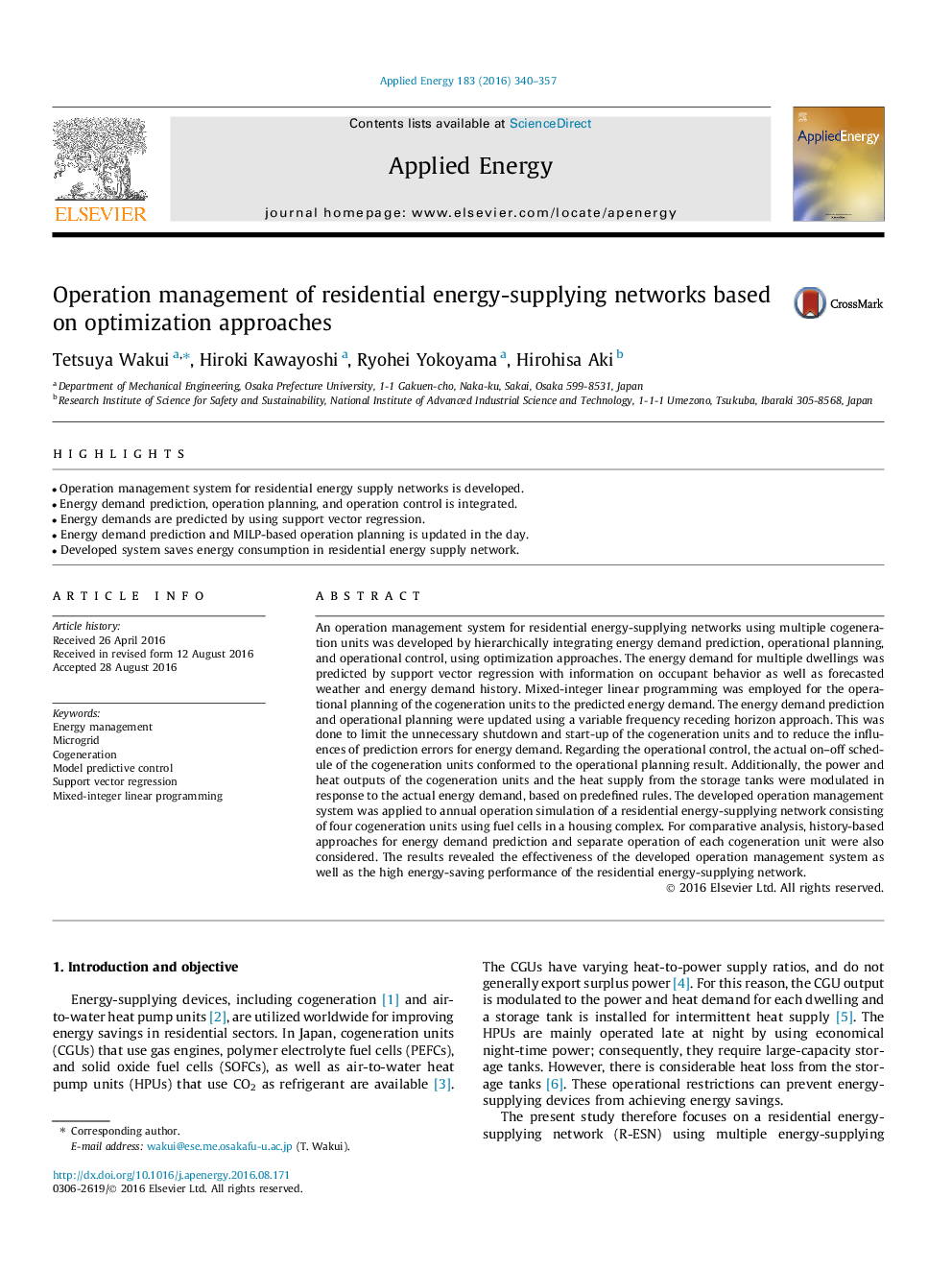| کد مقاله | کد نشریه | سال انتشار | مقاله انگلیسی | نسخه تمام متن |
|---|---|---|---|---|
| 4916579 | 1428105 | 2016 | 18 صفحه PDF | دانلود رایگان |
عنوان انگلیسی مقاله ISI
Operation management of residential energy-supplying networks based on optimization approaches
ترجمه فارسی عنوان
مدیریت عملیات شبکه های تامین انرژی مسکونی بر اساس روش های بهینه سازی
دانلود مقاله + سفارش ترجمه
دانلود مقاله ISI انگلیسی
رایگان برای ایرانیان
کلمات کلیدی
مدیریت انرژی، ریزشبکه، همگام سازی، کنترل پیش بینی مدل، رگرسیون بردار پشتیبانی، برنامه ریزی خطی مختلط عدد صحیح،
mixed-integer linear programming - برنامه ریزی خطی مخلوط عددیCogeneration - تولید همزمان گرما و برق یا به اخنصار تولید همزمان معروف به CHPSupport vector regression - رگرسیون بردار پشتیبانیMicrogrid - ریزشبکه Energy management - مدیریت انرژیModel predictive control - کنترل پیش بین، کنترل پیش بینی مدل
ترجمه چکیده
یک سیستم مدیریت عملیات برای شبکه های تامین انرژی مسکونی با استفاده از واحدهای تولید کودهای مختلف، با استفاده از سلسله مراتب پیش بینی تقاضای انرژی، برنامه ریزی عملیاتی و کنترل عملیاتی با استفاده از رویکردهای بهینه سازی توسعه داده شد. تقاضای انرژی برای خانه های چندگانه با رگرسیون بردار پشتیبانی با اطلاعات مربوط به رفتار ساکنان و همچنین پیش بینی وضعیت تقاضای هوا و انرژی مورد پیش بینی قرار گرفت. برنامه ریزی خطی مختلط عدد صحیح برای برنامه ریزی عملیاتی واحدهای کوآگنتیک به تقاضای انرژی پیش بینی شده مورد استفاده قرار گرفت. پیش بینی تقاضای انرژی و برنامه ریزی عملیاتی با استفاده از فرکانس متغیر فرکانس پایین افق به روز شد. این کار برای محدود کردن خاموش کردن غیر ضروری و راه اندازی واحدهای تولید کادو و کاهش تاثیر خطاهای پیش بینی شده برای تقاضای انرژی انجام شد. با توجه به کنترل عملیاتی، برنامه زمان واقعی خاموش کردن واحدهای تولید کادو سازگار با نتیجه برنامه ریزی عملیاتی بود. علاوه بر این، خروجی های انرژی و گرما از واحدهای تولید انرژی و حرارت از مخازن ذخیره سازی در پاسخ به تقاضای انرژی واقعی، بر اساس قوانین از پیش تعریف شده، تعدیل شد. سیستم مدیریت عملیات توسعه داده شده به شبیه سازی عملیات سالانه یک شبکه تأمین انرژی مسکونی متشکل از چهار واحد تولید مجدد کربن با استفاده از سلول های سوختی در مجتمع مسکونی اعمال شد. برای تجزیه و تحلیل تطبیقی، رویکردهای مبتنی بر تاریخ برای پیش بینی تقاضای انرژی و عملیات جداگانه هر واحد همگن نیز مورد توجه قرار گرفت. نتایج نشان داد که اثربخشی سیستم مدیریت عملیات توسعه یافته و همچنین عملکرد با صرفه جویی در انرژی صرفه جویی در شبکه تامین انرژی مسکونی.
موضوعات مرتبط
مهندسی و علوم پایه
مهندسی انرژی
مهندسی انرژی و فناوری های برق
چکیده انگلیسی
An operation management system for residential energy-supplying networks using multiple cogeneration units was developed by hierarchically integrating energy demand prediction, operational planning, and operational control, using optimization approaches. The energy demand for multiple dwellings was predicted by support vector regression with information on occupant behavior as well as forecasted weather and energy demand history. Mixed-integer linear programming was employed for the operational planning of the cogeneration units to the predicted energy demand. The energy demand prediction and operational planning were updated using a variable frequency receding horizon approach. This was done to limit the unnecessary shutdown and start-up of the cogeneration units and to reduce the influences of prediction errors for energy demand. Regarding the operational control, the actual on-off schedule of the cogeneration units conformed to the operational planning result. Additionally, the power and heat outputs of the cogeneration units and the heat supply from the storage tanks were modulated in response to the actual energy demand, based on predefined rules. The developed operation management system was applied to annual operation simulation of a residential energy-supplying network consisting of four cogeneration units using fuel cells in a housing complex. For comparative analysis, history-based approaches for energy demand prediction and separate operation of each cogeneration unit were also considered. The results revealed the effectiveness of the developed operation management system as well as the high energy-saving performance of the residential energy-supplying network.
ناشر
Database: Elsevier - ScienceDirect (ساینس دایرکت)
Journal: Applied Energy - Volume 183, 1 December 2016, Pages 340-357
Journal: Applied Energy - Volume 183, 1 December 2016, Pages 340-357
نویسندگان
Tetsuya Wakui, Hiroki Kawayoshi, Ryohei Yokoyama, Hirohisa Aki,
